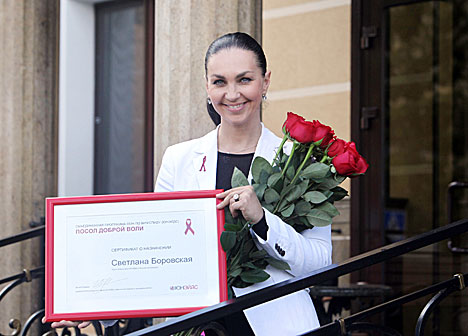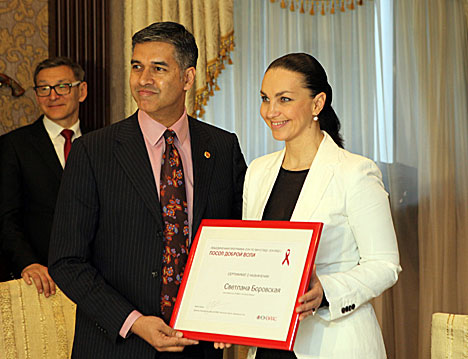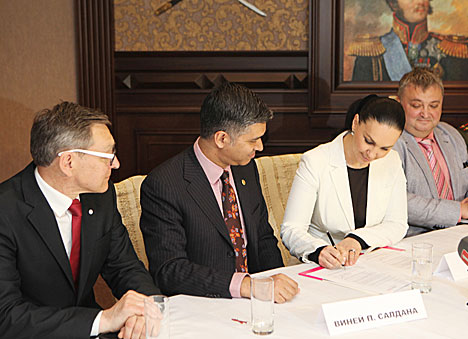Press releases
Svetlana Borovskaya appointed UNAIDS Goodwill Ambassador in Belarus
GOMEL, 18 May (BelTA) - UNAIDS, the Joint United Nations Programme on HIV/AIDS, has appointed TV anchor and actress Svetlana Borovskaya its Goodwill Ambassador in Belarus, BelTA has learned.
UNAIDS Regional Director for Eastern Europe and Central Asia Viney Saldana said that he welcomes the opportunity to cooperate with Svetlana Borovskay in a new capacity. "She shares our principles, ideas, enjoys great trust from all social strata and groups in Belarus. We hope that with the help of the newly appointed Ambassador we will provide support to people living with HIV, promote the idea of timely HIV testing, treatment and fight stigma and discrimination,” he said.
 Svetlana Borovskaya noted that she is honored to become the UNAIDS Goodwill Ambassador in Belarus. "My new tasks coincide with my personal priorities in life. I am ready to exert every effort for Belarus to become the first country in Eastern Europe and Central Asia to reach the 90-90-90 goals,” she said.
Svetlana Borovskaya noted that she is honored to become the UNAIDS Goodwill Ambassador in Belarus. "My new tasks coincide with my personal priorities in life. I am ready to exert every effort for Belarus to become the first country in Eastern Europe and Central Asia to reach the 90-90-90 goals,” she said.
90–90–90 is an ambitious treatment target to help end the AIDS epidemic.
By 2020, 90% of all people living with HIV will know their HIV status. By 2020, 90% of all people with diagnosed HIV infection will receive sustained antiretroviral therapy. By 2020, 90% of all people receiving antiretroviral therapy will have viral suppression.
 Svetlana Borovskaya already participates in the awareness raising campaigns and even introduced ‘the Borovskaya rule’ - to pass the medical test, including an HIV test, at least once every six months. As the UNAIDS Goodwill Ambassador, she will pay particular attention to the programs to prevent HIV transmission among especially vulnerable groups, such as women in prison.
Svetlana Borovskaya already participates in the awareness raising campaigns and even introduced ‘the Borovskaya rule’ - to pass the medical test, including an HIV test, at least once every six months. As the UNAIDS Goodwill Ambassador, she will pay particular attention to the programs to prevent HIV transmission among especially vulnerable groups, such as women in prison.
As part of a delegation of representatives of UNAIDS and national specialists, Svetlana Borovskaya visited Correctional Facility No. 4 of the Corrections Department of the Gomel Oblast Interior Department. There are 90 HIV-positive women in this correctional facility. During the visit, the experts discussed the issues of coordination of action by the state services, international and public organizations to strengthen commitment to the treatment of HIV infection in HIV-positive women in prison and support for their reintegration.
 Currently there are over 1.1 million HIV-positive people in the region of Eastern Europe and Central Asia. Every year, this figure increases by about 110,000. Today women account for over 40% of new HIV infection cases.
Currently there are over 1.1 million HIV-positive people in the region of Eastern Europe and Central Asia. Every year, this figure increases by about 110,000. Today women account for over 40% of new HIV infection cases.







 print version
print version make home page
make home page add to bookmarks
add to bookmarks

